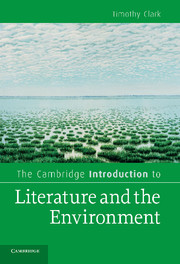The animal mirror
Published online by Cambridge University Press: 05 June 2012
Summary
In the question of the animal, or rather of other animals, ecocriticism finds perhaps its most striking ethical challenge. James Rachels writes:
We kill animals for food; we use them as experimental subjects in laboratories; we exploit them as sources of raw materials such as leather and wool; we keep them as work animals. These practices are to our advantage, and we intend to continue them. Thus, when we think about what animals are like we are motivated to conceive them in ways that are compatible with treating them in these ways. If animals are conceived as intelligent, sensitive beings, these ways of treating them might seem monstrous. So humans have reasons to resist thinking of them as intelligent or sensitive.
A first issue is that of animal ethics: how should animals be regarded and treated? What questions are raised by the way humans differentiate themselves from other creatures? What happens if ‘person’ is no longer understood so as to exclude the non-human?
Writing about animals poses a challenge distinct from writing about places, ecosystems, landscapes or pollution. Whereas ecology in the strict sense will consider animals only as a group or species, in relation to threats to population size, habitat and so on, and may happily talk of the need of a cull of some species to ‘protect the environment’, an animal ethics will often concern the animal as an individual existence, more in the way in which a person is considered.
- Type
- Chapter
- Information
- The Cambridge Introduction to Literature and the Environment , pp. 179 - 182Publisher: Cambridge University PressPrint publication year: 2011

